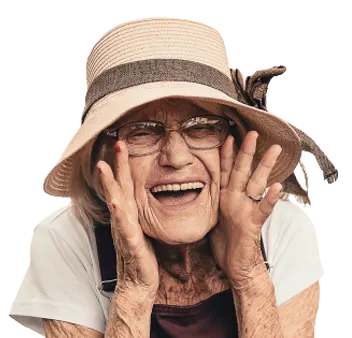Nobody likes stereotypes. They’re hurtful, untrue, and perpetuate problematic ideas and attitudes towards entire groups of people. Unfortunately, almost every group of people, regardless of race, ethnicity, religion, or genders, falls prey to stereotypes. Older adults are no exception, and stereotypes against them are referred to as ageism.
And though most of us don’t intend to be ageist, we can display these attitudes without even meaning to. Even older adult caregivers can be ageist unintentionally.
“These attitudes and ideas about older adults are so entrenched in our culture that even the most well-intentioned of us can be ageist without meaning to,” Jennifer Curry, AgeWell Atlanta Program Manager, said. “Even if you don’t intend to be ageist, it’s crucial to understand the harm it can do, and to do the necessary work to stop participating in it.”
To help build a more inclusive and compassionate world, AgeWell Atlanta takes a firm stance against ageism and aims to help educate others about the dangers of it. This starts with breaking down common examples of ageism, and what you should say or do instead.
What is ageism?
Ageism is an all-encompassing phrase for a harmful set of beliefs and behaviors about and directed at older adults that affects their quality of life. This includes:
- Stereotyping, prejudice, and discrimination against individuals based on their age
- Pervasive misconceptions, negative attitudes, and assumptions about older adults
- Being treated as a marginalized community within the medical space, leading to health issues and complications
- Older adults being seen as a “burden” to their families and society
- Often having the contributions of older adults be overlooked in favor of those by younger people
What are common examples of ageism? What can I do instead?
There are many ways you can choose not to participate in ageism. A few of the most common ways are below.
- Use adult vocabulary and diction when speaking to an older adult, as opposed to “baby talk” and oversimplifying words, which can come across as patronizing.
- Address older adults by the name they give you, instead of immediately using cutesy nicknames like “honey” or “sweetie.” It can be insulting to use these nicknames before a connection has been established and the nickname has been deemed acceptable. If you are unsure how to address a person, Mr. or Ms. followed by their last name is a safe bet.
- Avoid over-explaining basic terminology about computers, TVs, or other technical subjects. Assume most older adults you speak to will know what you are talking about, and only clarify when asked.
What is AgeWell Atlanta doing to combat ageism in the Atlanta community?
AgeWell Atlanta and its partners (MJCCA, JF&CS Atlanta, Jewish HomeLife, and the Jewish Federation of Greater Atlanta) have many programs and resources in place that encourage independence among older adults and fight ageism in the Atlanta community.
Jewish HomeLife resident, Mimi Gould, speaks on an unexpected obstacle that comes with aging, which many may not think about: “It has become a challenge using toilets in stores, movie theaters, restaurants, even doctor’s offices, any and all public facilities. The toilet seats are easily accessible for small tots, but for the aging, it is a gymnastic challenge. They are so low one can hardly get up and off. And, most importantly, no handlebars are available for a “pull up” assist! Getting old is a chore for a squatting necessity!”
All facilities in the Jewish HomeLife network are committed to providing a high quality of life to its residents, which includes avoiding ageist behaviors and educating others.
At JF&CS Atlanta, Aviv Older Adult Services has numerous programs in place that treat aging adults with dignity and compassion. One of the most popular is the One Good Deed program, where an active older adult is matched with a younger friendly visitor for company and friendship.
A participant in the One Good Deed program, then-96-year-old Ellie, said of her volunteers: “They are both so wonderful. They don’t treat me like an old lady, and they make me feel young again. I have found such a feeling of comfort and acceptance in my friendship with them both. I am blessed every single day for these two women who have made my life so wonderful.”
The MJCCA’s Active Mature Adults programming includes classes on everything from cooking to ballroom dancing, discussion groups for all interests, sports and fitness programs for all ability levels, and more. These programs are catered to appeal to universal interests and hobbies, as opposed to specializing in stereotypically older adult interests.
AgeWell Atlanta helps aging adults and their families in the metro Atlanta area with support, resources, and warm handoff referrals to places that can help. If you have questions about other age-related topics, contact us today at 1.866.AGEWELL (243-9355) or info@agewellatl.org.
For more posts about age-related topics, and events in the metro Atlanta area for aging adults and families, sign up for our weekly email newsletter.
